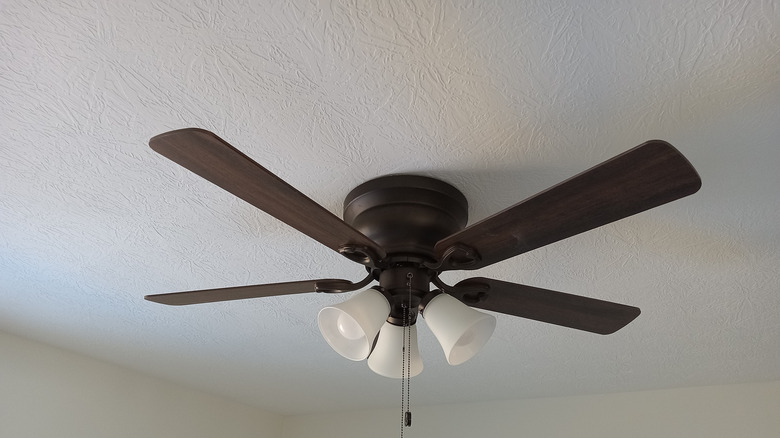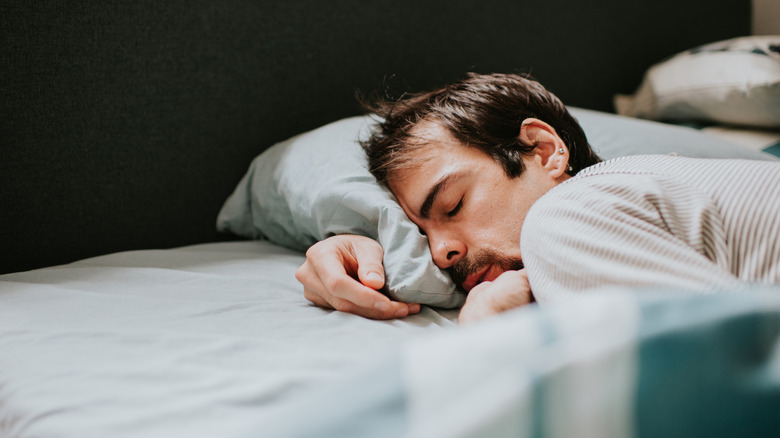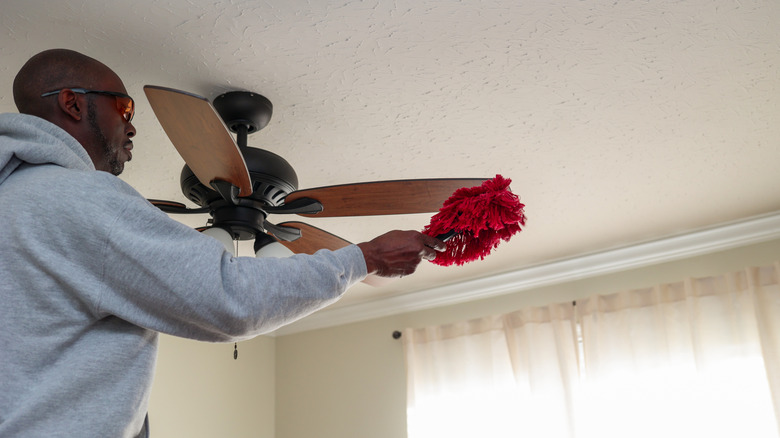The Unexpected Downsides Of Leaving Your Ceiling Fan On All Night
Are you a white noise, cold room, blackout curtain kind of person? You certainly would not be alone in these preferences, and during the summer months, your fan can help with two out of three. Keeping your ceiling fan on overnight is a fairly standard practice, but some worry about various downsides of this appliance when they are sleeping. While it can certainly help keep the temperature in your rooms lower and even provide a little white noise if it's on high, ceiling fans sometimes leave people wondering if extended use can cause unnecessary wear. Fears like the fan falling or overheating are unlikely, but there are a few drawbacks to keeping your ceiling fan on. Excessive allergens, poor air quality due to dust, congestion, and even painful sleep can be attributed to using this appliance while you're catching zzzz's, but there are solutions to help these, too.
While your air conditioning may be on, sometimes having that little extra boost from the fan creates the most ideal sleep setup. Fans can help circulate the air your AC unit is pumping out. Other people swear the white noise helps them, too, so the combination is a match made in heaven. The concerns over sleeping with your fan on come from worry about burning out the motor or even causing electrical fires, but these are not what should determine whether to leave it on for longer stints. Your fan can get warm as it runs and generates power, but this isn't a risky scenario as long as the fan is properly installed and in good condition. Just turn it off when you're not in the room.
Your fan could be causing congestion or poor sleep
The biggest issue with keeping your fan on overnight is the dust and allergens it can stir up and spread around. Whether from the blades or just general particles around the room, the air is pushing these potential allergens out and into your sinuses. If you suffer from allergies, asthma, or constant congestion, your fan could be contributing to this, especially if it is dirty. The best way to clean your ceiling fan includes wiping the blades to remove dust. That way you're not inhaling it whenever the unit is on. Should you breathe in a lot of dust particles, you could keep waking up coughing or sneezing, which also disrupts your sleep patterns.
While certainly one of the biggest issues, this isn't the only reason you may want to reconsider using your fan every evening. The constant flow of air could also dry out your skin, sinuses, and eyes, although this may not be a problem for everyone. If you do notice this, try resting without your fan to see if that helps.
Lastly, this appliance could be contributing to muscle aches and even pain that stays with you throughout the night. When sleeping in a space that's too cold, your body could clench, creating muscle tension that will stay even when you're awake. It's important to remember that all of these cons are only probabilities and will vary from person to person. You may get the best sleep of your life with the fan on, never having to deal with any of these symptoms.
Tips for using your fan overnight
Even if your ceiling fan is causing some of these issues, there are solutions. Keeping the unit turned off during the day is obviously one potential option, however, this could create its own problems. If you need the fan to help cool down your room, make sure the blades are free of dust so it isn't affecting your sinuses. It's also important to dust the rest of your room, as the air flow from your ceiling unit can blow dust around and still allow it to affect you. Don't forget to dust around trim and even near the ceilings when you deep clean. These may be some of the most likely places you are forgetting to clean, but they can harbor a lot of particles. If your fan is still causing you to be stuffy or cough, add a humidifier to your room to help negate the dry climate. Staying hydrated will also help with this.
Tower fans may be another option to provide air flow without stirring up as much dust, though this will vary with location, how far the air can reach from your fan, and the settings you use. Try to find an energy-efficient ceiling fan to help with utility cost and general wear, too.
As for muscle pain from clenching, you may want to turn the ceiling fan off or increase the temperature on your AC by a few degrees to avoid feeling too cold. You can purchase pillows and bedding solutions that help keep your body as relaxed and ideally positioned as possible. If you run hot, consider a cooling gel material that contributes to lowering your body temperature to a good level and memory foam to offer stability to your neck.


